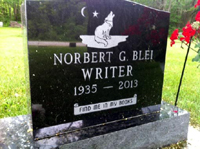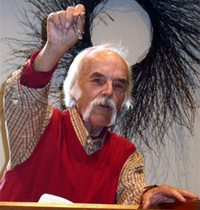
Poetry Dispatch No. 56 | February 14, 2006
Marriage by Edith Nash
Before we were married
I always had a poached egg on rye toast for breakfast
But since my husband didn’t like rye toast
And didn’t want to eat the same thing every day
I would make white toast, and scramble or fry…
But I still likes eggs my way
So every once in a while
jaw set, lips clenched
I made rye toast for us both
And one day
Only 52 years later—my husband looked at me
And said,
“You know, rye toast and poached eggs
Are quite good.”
 from PRACTICE, The Here and Now, Cross+Roads Press, 2001
from PRACTICE, The Here and Now, Cross+Roads Press, 2001
 Edith Nash (July 12, 1913-November 9, 2003) was an educator and poet.
Edith Nash (July 12, 1913-November 9, 2003) was an educator and poet.
Edith Henriet (Rosenfels) Nash was born in Oak Park, Illinois, where she was a childhood friend of a sister of Ernest Hemingway. She met her future husband, Wisconsin anthropologist and politician Philleo Nash, while in college in Chicago. On November 2, 1935, they married. Edith Nash, trained as an anthropologist, did field work in the American West among Native Americans in the 1930s. In the 1940s through the 1950s, she was the second director and co-founder of the Georgetown Day School, the first racially integrated school in Washington, D.C..
Edith Nash also wrote poetry and critical essays. Practice: The Here and Now (Cross+Roads Press, 2001), her best-known book, includes a sample of her poetry and prose. She spent three decades of her life in her husband’s home town, Wisconsin Rapids, Wisconsin, from which she managed a Biron, Wisconsin, cranberry marsh and became a major player in local and state politics. She was an early supporter of U.S. Senator Russ Feingold, a Wisconsin Democrat.
She wrote about her 1930s “coming out” party at a Chicago speakeasy, meeting “Ernie” Hemingway at his Oak Park parent’s home in 1929, and the progressive causes she championed all the years of her life. Nash’s husband was targeted (and condemned on the floor of the U.S. Senate) by Wisconsin U.S. Senator Joseph McCarthy, a Republican whose name is now linked forever to the tactic of unfounded political attacks. However, that didn’t stop his wife from soliciting money for the Georgetown Day School from McCarthy when she met him by chance in the 1950s. Her life was celebrated in the poem “When You’re Eighty-Five,” which was published by her friend Mark Scarborough in the summer 2001 issue of the Wisconsin Academy Review.
Among Nash’s other writer friends were Muriel Rukeyser and Frances Hamerstrom. Nash, an inspiration for generations of writers in central Wisconsin, also was a tireless advocate of free expression during her tenure as a member of a book review committee of the Wisconsin Rapids Public Schools and as a co-founder (with then Lincoln High School student Elisa Derickson) of the Elisa Derickson Fund for Creative Writing, South Wood County Community Foundation, Wisconsin Rapids, Wisconsin.
Edith Nash’s other volumes of poetry include White Line on the Left (Round Robin Press, no date, but circa 1990), The Words (Home Brew Press, 1992), Now is the Time (Round Robin Press, 1996), and A Christmas Offering: Selected Poems, 1985-2000 (privately printed, 2000). Her poetry was also included in the anthologies The Poetry of Cold (Home Brew Press, 1997) and At the Heart of Riverwood (Round Robin Press, 2000). Her poems and essays were published in publications as varied as Free Verse, Wisconsin Poet’s Calendar, and Wisconsin River Valley Journal. She was the founder of the Riverwood Roundtable, a central Wisconsin literary society.
Edith Nash died in Wisconsin Rapids, Wisconsin.



























































Recent Comments